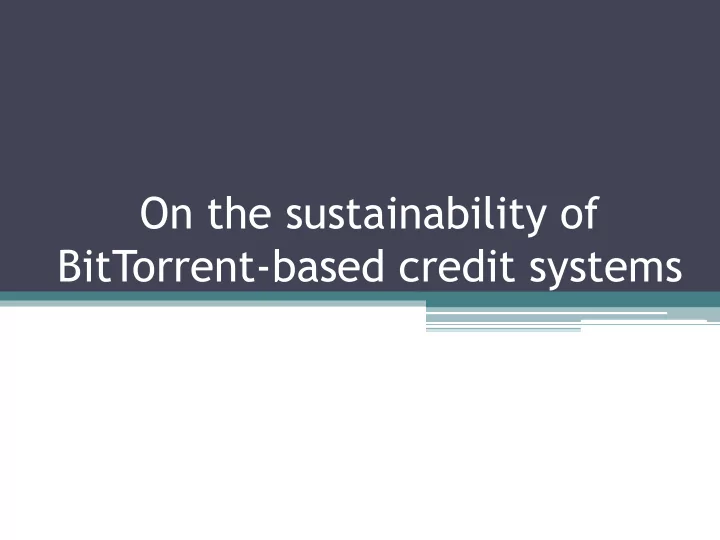

On the sustainability of BitTorrent-based credit systems
BitTorrent - reminder • tracker: keeps a record of every transaction, peer and swarm • private communities: own incentive policies ▫ sharing ratio enforcement, credit amount checking • credit ~ money
Simulator • simplified model ▫ one peer participates in one swarm at a time ▫ completely closed community • 1000 peers, 100 files, 1 credit = 1 piece • upload: 4 pieces/generation • varying file size and credit amount • varying download speed
1. Connection between file size and sustainability • reproducing results of an article • crash/crunch doesn’t only depend on the initial ratio of rich/poor peers • average file size has a huge impact as well • simulations: 10 -> 100 size, 40% ->80% rich
Homogeneous peers, default case • earlier: initial 40% rich is safe • 80%: unbalanced system
Homogeneous peers, constrained leecher upload • Why does a system go down? • crash/crunch -> bad credit distribution • observation: too rich leechers • constraining credit earning while leeching? • nothing changes with homogeneous peers and fix credit amount
Heterogeneous peers, default case • one step closer to reality: different download speeds • good news: easier to sustain at 40% and 80%
2. Changing the inital credit amount • motivation: crash/crunch + adaptive credit • earlier configuration: (#rich peers)*fileSize • now: step 5%, up to +30% • distribution of extra credits: randomly among the peers • similar to real systems (snapshot)
Homogeneous peers, default case • average: correlation between ratio and credit amount • max throughput could be increased • no effect on min throughput
Homogeneous peers, constrained leecher upload • even collapses at the earlier stable 70% ratio • 50% & 60%: minimal throughputs are better
Heterogeneous peers • default case: more stable at 80% • constrained upload: average throughput decreases • BUT: min & max throughput could be increased
Heterogeneous peers
Thank you!
Recommend
More recommend